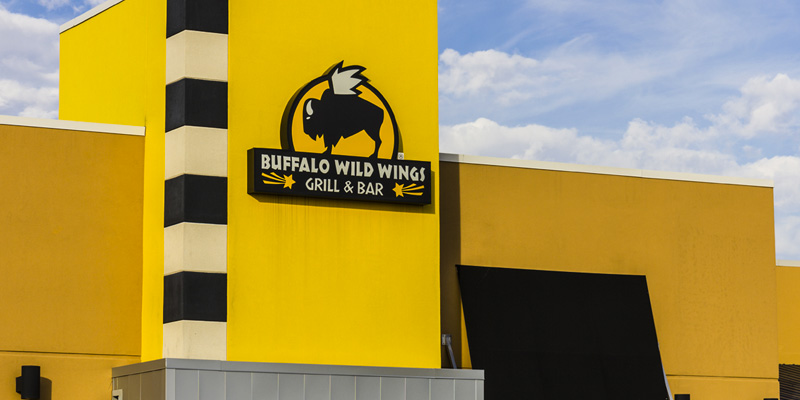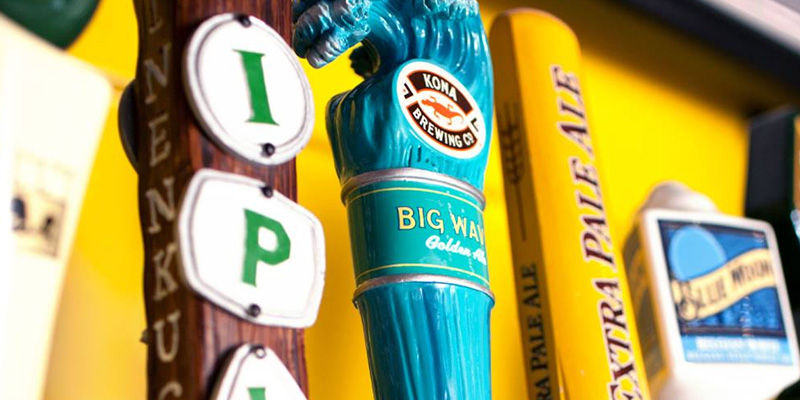
When you hear “Buffalo Wild Wings,” your first thought is probably not craft beer. A conglomerate that cranks out 27 million wings a week, Buffalo Wild Wings is probably more often associated with the kinds of big American lagers you’d expect to find at a casual dining and sports bar franchise. But if Bud is the beer you’d associate with Buffalo Wild Wings, you’d be wrong.
In fact, since 2013, the chain has been making a strategic foray into craft beer. With more than 1,200 locations in North America, the chain sells more draft beer than anyplace else in the country.
It wasn’t always part of Buffalo Wild Wings’ mission to get craft brewers’ suds in their diners’ frosty mugs. Buffalo Wild Wings, founded in 1982 and headquartered in Minneapolis, specializes in what press literature refers to as “21 mouth-watering signature sauces and seasonings with flavor sensations ranging from Sweet BBQ™ to Blazin’®.” From the get-go, the company has been all about wings, football-watching, and beer.
Until recently, the chain focused on domestic lagers. But as American beer developed from macro lager to barrel-aged cask, so did Buffalo Wild Wings, or “B-Dubs,” as executives and super-fans fondly refer to it.
“Beer has always been part of the Buffalo Wild Wings brand heritage, and as the beer industry has evolved, Buffalo Wild Wings has made a conscious effort to evolve with it,” explains Andrea Benzschawel, director of beverage. “As a draft beer authority, it’s our job to constantly be on the cutting edge of the latest trends, introducing our guests to new and unique styles of beer that help them up their beer game.”
It’s easy to see why their beer sales are so brisk. Like a candy store for the 21-plus set, the bar boasts a sprawling menu of detailed beer choices, which includes the beer’s name, category, and percentage alcohol. Stumble into any Buffalo Wild Wings and you’ll find mesmerizingly large television screens displaying images of sweating bodies engaged in intimidating feats of athleticism and derring-do.
And though B-Dubs is a chain, its turn to craft beer has it indulging in the hyper-local. In addition to Bud Light and Stella Artois (yep, they are still there), visitors will find the best and most diverse examples of craft beer anywhere within 50 miles. In Brooklyn, Ohio, for example, Great Lakes Dotmunder Gold, Goose Island Greenline Pale Ale, and Rogue Brutal IPA Cask are all currently on tap. A portion of the company’s draft lines are national and international, but each store will have some local, or at least regional, taps, guaranteed, Benzschawel says.

It means that this huge conglomerate is establishing relationships in local communities. “Craft beer helps Buffalo Wild Wings to create local connections and to provide a variety of styles that deliver full and unique flavors,” Benzschawel explains. Bartenders can then help steer diners toward food-beer pairings. And because much of the fare is spicy, the food lends itself to being eaten with a more assertive, hoppier brew than the typical guest might reach for elsewhere.
The commitment to small-batch brewers is more than lip service. B-Dubs has partnered with craft beer powerhouses like Red Hook and Lagunitas to create special beers only available on their drafts, for limited time, though the runs get extended if they’re super popular.
It’s not just Buffalo Wild Wings going to craft brewers in search of pairings for their wings, either. The relationship is fully symbiotic in that brewers will come to B-Dubs, too. In 2013, Red Hook Brewery tapped into Buffalo Wild Wings’ guest feedback to develop Game Changer, a signature beer brewed specifically to complement wings, Benzschawel says. Then, in 2015, Red Hook Brewery released a new seasonal expression of Game Changer, the Game Changer Session IPA, a beer for watching football. In November, Buffalo Wild Wings teamed up with Lagunitas Brewing Company to create a hoppy pale wheat ale called Fandom Ale.
“With each of these new beers, we look for opportunities to deliver something that is sessionable, sports fan-centric, and pairs well with our wings,” Benzschawel explains.
It’s paying off for everyone. While the chicken wing chain has struggled in the past to exceed or even meet same-store sales, during the third quarter of last year, Motley Fool reports, the stock rebounded 20 percent from recent lows. The company attributed that bounce to one thing: craft beer. You can expect a lot more cool craft beer collabs in the future, thanks to the fact that 20 percent of the chain’s $2 billion in sales traditionally comes from booze; the success of past partnerships is directly reflected in the stock price. And this success, too, is a two-way street: Craft beer sales grew 12.8 percent by volume in 2015, according to the Brewers Association, whereas beer sales overall grew by 0.2 percent.
Unlike, say, McDonald’s, or other mainstream fast-food restaurants that have arguably earned their super-sized reputation as a causal part of the dumbing down of America’s palate, B-Dubs is investing in small, local businesses and introducing exotic flavors to people in a user-friendly setting. The decision to partner with craft beer ended up introducing thousands of Americans who live in rural pockets of the country not populated by hop-obsessed hipsters to the merits of and differences between, say, fruited sours and bourbon-barrel-aged IPAs. Kind of like well-meaning parents trying to teach toddlers to eat spinach, B-Dubs has tricked lovers of mass-market lager into trying that Kölsch on for size, broadening their palate and paradigm in the process.
